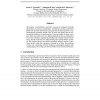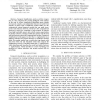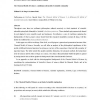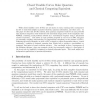3406 search results - page 2 / 682 » Computational models of classical conditioning |
NIPS
2004
13 years 6 months ago
2004
We propose a probabilistic, generative account of configural learning phenomena in classical conditioning. Configural learning experiments probe how animals discriminate and gener...
IROS
2007
IEEE
13 years 11 months ago
2007
IEEE
Abstract— Temporal classification, such as activity recognition, is a key component for creating intelligent robot systems. In the case of robots, classification algorithms mus...
SIBGRAPI
2009
IEEE
13 years 11 months ago
2009
IEEE
—This work aims at investigating the influence of luminance information and environment illumination on skin classification. We explore Bayesian approaches to perform automatic...
SYNTHESE
2010
13 years 3 months ago
2010
Throughout more than two millennia philosophers adhered massively to ideal standards of scientific rationality going back ultimately to Aristotle’s Analytica posteriora. These s...
ECCC
2008
13 years 5 months ago
2008
While closed timelike curves (CTCs) are not known to exist, studying their consequences has led to nontrivial insights in general relativity, quantum information, and other areas....




